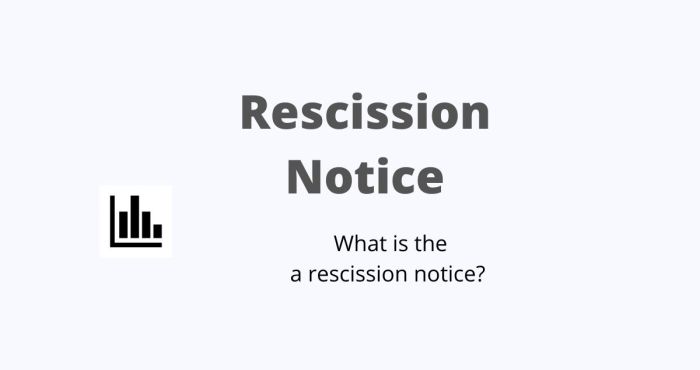The seemingly innocuous insurance policy can become a battlefield when an insurer issues a rescission notice, effectively voiding the contract and leaving the policyholder in a precarious financial and legal position. This action, often shrouded in legal jargon, can leave individuals scrambling to understand their rights and options.
This comprehensive guide dissects the complexities of insurance rescission, equipping readers with the knowledge to navigate this challenging situation.
From the legal underpinnings of rescission to the practical steps policyholders should take, we explore the entire process. We examine common reasons for rescission, the rights of the insured, potential legal challenges, and strategies for dispute resolution. Crucially, we also offer insights into preventing rescission in the first place and provide real-world examples to illuminate the complexities involved.
Case Studies of Rescission

Rescission of an insurance contract, a powerful remedy allowing an insurer to void the agreement and reclaim premiums, is governed by complex legal principles and often hinges on the specific facts of each case. The following case studies illustrate both successful and unsuccessful challenges to rescission notices, highlighting the crucial factors influencing the outcome.
Successful Challenge to Rescission: The Case of Accurate Disclosure vs. Misinterpretation
In this hypothetical scenario, Ms. Anya Sharma applied for a homeowner’s insurance policy, accurately disclosing a previous minor plumbing incident on her application. The insurer, however, interpreted this disclosure as evidence of a pre-existing condition far more significant than it actually was.
They subsequently issued a rescission notice, claiming Ms. Sharma had made a material misrepresentation. Ms. Sharma challenged the rescission, presenting supporting documentation—repair bills, inspector’s reports—that demonstrated the incident was minor and fully resolved. A court ruled in her favor, finding the insurer’s interpretation of her disclosure unreasonable and their rescission unjustified.
The court emphasized the importance of a fair and objective assessment of the disclosed information, rather than an overly-strict interpretation that favored the insurer.
Unsuccessful Challenge to Rescission: The Case of Omitted Material Fact
Mr. Ben Carter applied for life insurance, omitting a history of significant cardiovascular issues. He subsequently suffered a heart attack, leading the insurer to investigate his application. The insurer discovered the omitted medical history, a material fact directly relevant to the risk assessment.
They issued a rescission notice, claiming Mr. Carter’s omission constituted a material misrepresentation. Mr. Carter argued that he had not intended to deceive the insurer, and that the omission was an oversight. However, the court found the omitted information material and crucial to the insurer’s underwriting decision.
The court upheld the rescission, emphasizing that the insurer’s right to rescind was triggered by the omission of a material fact, regardless of intent.
Key Factors Contributing to Case Outcomes
The contrasting outcomes in these hypothetical cases highlight the critical role of materiality and intent in rescission disputes. In Ms. Sharma’s case, the successful challenge stemmed from the insurer’s unreasonable interpretation of a truthfully disclosed, albeit ambiguously worded, fact.
Conversely, Mr. Carter’s unsuccessful challenge resulted from the omission of a material fact, which significantly altered the insurer’s risk assessment. The court’s focus on the objective materiality of the information, rather than the insured’s subjective intent, proved decisive in both scenarios.
| Case | Issue | Outcome | Key Factor |
|---|---|---|---|
| Ms. Sharma | Misinterpretation of Accurate Disclosure | Successful Challenge | Unreasonable insurer interpretation |
| Mr. Carter | Omission of Material Fact | Unsuccessful Challenge | Materiality of omitted information |
Ending Remarks

Facing a rescission notice from your insurance company can be a daunting experience, but understanding your rights and options is crucial. This guide has provided a framework for navigating the legal and financial ramifications of this action. Remember, proactive measures during the application process, coupled with prompt and decisive action upon receiving a rescission notice, significantly improve the chances of a favorable outcome.
While the process can be complex, armed with knowledge and potentially legal counsel, policyholders can effectively protect their interests.

